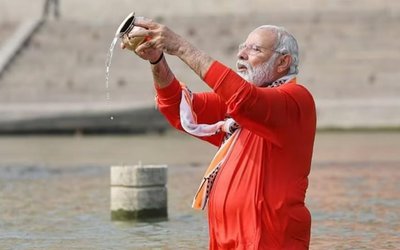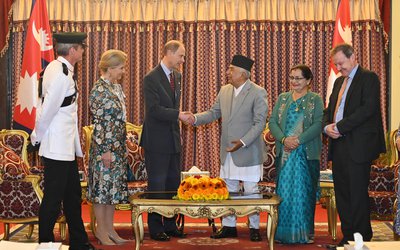
With the death of renowned industrialist Lunkaran Das Chaudhary, who passed away age of 94, Nepal’s industrial and trade sector has a lost a man with the memory of economic transformation of Nepal.
His establishment flourished from Kathmandu and earned renown as a company in different parts of the world. Fromthe Rana period of isolation to the present open market, late Lunkaran Das played an important role to promote trade and commerce in the country.
Son ofBhuramull Chaudhary, late Lunkaran Das embarked on his long and successful journey as an industrialist byfollowing his father's path. Grooming his three sons and a daughter in local atmosphere, late Chauhdary taught his sons how he loved the soil where he was born and grew up. As he admitted his sons atthe local schools, they all can now speak local Newari language so fluently that they have adopted the culture of Kathmandu. As he died at the age of 94, his grandsons were gradually coming up to take the reign of business.
Born as the elder son of Bhuramal Chaudahry and Sarashowti Devi in B.S. 1979 at Indrachowk, Kathmandu, Lun Karan had entered the business field as a help to his father who came from Rajasthan, India. But he soon diversified industries, beginning with jute, while continuing the trading on cloth. He and his father used to sell textiles and saris imported from India to the royal palace and residences of royal families and Rana rulers.
After the death of his father, he did business under the banner Bhuramal-Lunkaran. His sons expanded further under the banner of Chaudhary Group which has now gone international and his eldest son Binod Chaudhary has made it into the list of world’s billionaires as compiled by Forbes.
Along with working for his business, late Chaudhary was a champion of chamber movement and was among the founders of different chambers and business associations such as Federation of Nepalese Chambers of Commerce and Industry (FNCCI) and Nepal Marwadi Sewa Samiti.
His three sons; Binod, Basant and Arun Chaudhary are running different businesses under the Chaudhary Group. His only daughter, Kusum Agrawal, too, is in a business house.
Bhuramull stopped wandering from door to door to serve his clients when then Rana Prime Minister Juddha Shumsher allowed him to operate a store in New Road. The permission was granted by acknowledging the benevolent attitude of the Marwari community towards victims of the devastating earthquake of 1933.
Soon, New Road saw a new store of Bhuramull Lunkaran Das Chaudhary. The opening of this textile store laid the foundation stone for creation of a business empire called Chaudhary Group, now one of the country’s leading business houses with around 40 companies under its wing.
The Group, which is worth over $1 billion today deals in a range of areas from biotechnology, education, electronics, finance and energy to fast movable consumer goods, construction materials, real estate, infrastructure and electronics.
Lunkaran Das, who is the founder of Chaudhary Group and Chaudhary Foundation, built the mammoth business house by laying every brick carefully and working strenuously.
At the time when Lunkaran Das lost his father, he had nothing but the family store. He then expanded to jute business and started exporting the product to India and Europe via Biratnagar. Later, he opened the first branch of Bhuramull Lunkaran Das Chaudhary in the eastern Nepali city of Biratnagar.
While the trade of imported textile was flourishing, Lunkaran Das decided to diversify his business and enter into construction sector, an area in which he had no prior experience.
He embarked on this journey by securing a sub-contract for construction of Kathmandu-Trishuli road section. Later, he also secured the contract to build Soaltee Hotel, now Crowne Plaza Kathmandu-Soaltee.
“My father used to say those who dream big should also have the courage to undertake tasks beyond one’s capacity,” Binod Chaudhary has written in his memoir. Binod has cherished this remark throughout his life.
“Since then, whatever we have done, we have done them in a bigger way than before,” Binod has said. Lunkaran Das later founded the first flooring and furnishing store and first departmental store called Arun Emporium in the country.
“He also believed that a strong private sector could help in rapid economic development of a country and create a prosperous nation,” said Pashupati Murarka, president of the Federation of Nepalese Chambers of Commerce and Industry.
- NEPAL’S ENERGY SECTOR: Facing Crisis
- Jan 28, 2025
- FAST TRACK: Moving In The Right Direction
- Jan 28, 2025
- SOUTH KOREAN SPECIAL ENVOY VISITS NEPAL: Gesture Of Goodwill
- Jan 28, 2025
- AMRIT BAHADUR RAI: A Career Diplomat
- Jan 27, 2025
- US PRESIDNET DONALD TRUMP: Begins Second Tenure
- Jan 27, 2025
















